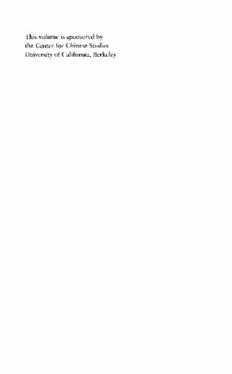
Communist Neo-Traditionalism: Work and Authority in Chinese Industry PDF
Preview Communist Neo-Traditionalism: Work and Authority in Chinese Industry
This volume is sponsored by the Center for Chinese Studies University of California, Berkeley Communist Neo-Traditionalism This page intentionally left blank Communist Neo-Traditionalism Work and Authority in Chinese Industry Andrew G. Walder University of California Press Berkeley / Los Angeles / London This book is a print-on-demand volume. It is manufac- tured using toner in place of ink. Type and images may be less sharp than the same material seen in traditionall printed University of California Press editions. The paper used in this publication meets the minimum requirements of American National Standard for Information Sciences—Permanence of Paper for Printed Library Materials, ANSI 739.48-1984. © To my parents Margaret and George Walder This page intentionally left blank Contents List of Maps X List of Tables xi Preface xiii Acknowledgments xix I. Communist Neo-Traditionalism: An Introductory Essay 1 The Neo-Traditional Image of Communist Society 2 Communist Neo-Traditionalism as a Type-Concept 8 Social and Economic Dependence on the Enterprise 14 Political Dependence on Management 17 Personal Dependence on Superiors 20 The Institutional Culture of Authority 22 Precis of the Analysis 27 The Factory as an Institution: 2. Life Chances in a Status Society 28 The Transition to a Communist Pattern 30 Demographic Problems and the Administrative Response 35 Status Groups in the Labor Force 39 The Supply and Allocation of State Sector Jobs 56 Social and Economic Aspects of the Employment Relationship 59 viii Contents Labor Mobility and Dependence on the Enterprise 68 Mobility and Life Chances in the Enterprise 76 The Structured Dependence of the Enterprise Community 81 3. The Party-State in the Factory 85 The Party-State and the Working Class 86 The Political Organization of the Factory 88 The "Foreman's Empire" on the Shop Floor 95 The Chinese Work Group System IO2 Stalinist and Maoist Mobilization: A Comparison 113 Principled Particularism: Moral and Political 4. Aspects of Authority 123 Social Ties in Ideological Groups 125 From Ideological Orientation to Principled Particularism 130 Biaoxian and the Flexibility of Rewards and Punishments 132 Worker Responses to Moral-Political Authority 143 The Substantive Ambiguity of Biaoxian 160 5. Clientelist Bureaucracy: The Factory Social Order 162 The Divided Workforce as a Social Fact 166 The Official Patron-Client Network 170 Cliques and Factions 175 Instrumental-Personal Ties 179 A Comparative Perspective 186 6. Maoist Asceticism: The Failed Revitalization 190 Maoism as a Revitalization Movement 191 Contents ix Trends in Real Wages and Living Standards 194 The Inequities of Wage Austerity 201 The Emergence of Indulgent Patterns of Authority 205 The Expanding Scope of Instrumental- Personal Ties 2IO The Decline of Work Groups 212 The Unintended Consequences of Revitalization 219 7. From Asceticism to Paternalism: Changes in the Wake of Maoism 222 From Asceticism to Paternalism 224 The Restriction of Moral-Political Mobilization 227 Recasting the Political Standards 229 The Redefinition of Activism 233 The Changing Role of the Party 235 Continuities in the Pattern of Dependence 237 The Evolving Institutional Culture 238 8. Theoretical Reflections 242 The Structure of Communist Societies 243 Social Stability and Legitimacy in Communist States 246 The Varieties of Modern Industrial Authority 249 The Evolution of Communist Societies 251 Appendix A: The Hong Kong Interviews: An Essay on Method 255 Appendix B: List of Informants 270 Bibliography 273 Index 295
